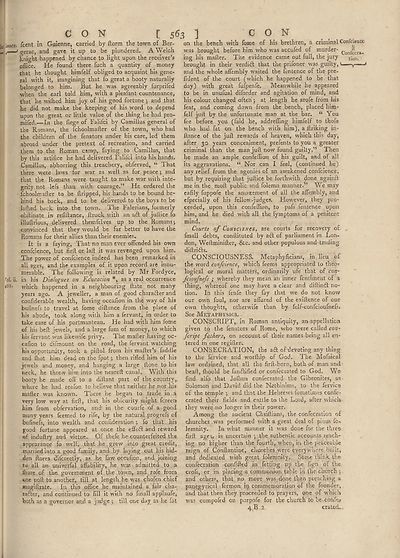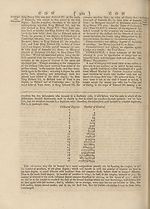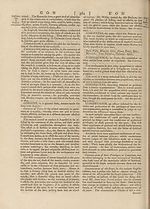Encyclopaedia Britannica, or, a Dictionary of arts, sciences, and miscellaneous literature : enlarged and improved. Illustrated with nearly six hundred engravings > Volume 6, CHI-Crystallization
(609) Page 563
Download files
Complete book:
Individual page:
Thumbnail gallery: Grid view | List view

CON
C 56.-? ]
CON
isnce.
Aol.
401.
fcent in Guienne, carried by ftorm the town of Ber¬
gerac, and gave it up to be plundered. A Welch
knight happened by chance to light upon the receiver’s
office. He found there fuch a quantity of money
that he thought himfelf obliged to acquaint his gene¬
ral with it, imagining that fo great a booty naturally
belonged to him. But he was agreeably furprifed
when the earl told him, with a pleafant countenance,
that he wilhed him joy of his good fortune > and that
he did not make the keeping of his word to depend
upon the great or little value of the thing he had pro-
mifed.—In the liege of Falifci by Camillas general of
the Romans, the fchoolmafter of the town, who had
the children of the fenators under his care, led them
abroad under the pretext of recreation, and carried
them to the Roman camp, laying to Camillus, that
by this artifice he had delivered Falilci into his hands.
Camillus, abhorring this treachery, obferved, “ That
there were laws for war as well as for peace and
that the Romans were taught to make war with inte¬
grity not lefs than with courage.” He ordered the
fchoolmafter to be llripped, his hands to be bound be¬
hind his back, and to be delivered to the boys to be
laftied back into the town. The Falerians, formerly
obftinatc in refiftance, ftruck with an aft of juftice fo
illuftrious, delivered themfelves up to the Romans j
convinced that they would be far better to have the
Romans for their allies than their enemies.
It is a faying, That no man ever offended his own
confcience, but firft or laft it was revenged upon him.
The power of confcience indeed has been remarked in
all ages, and the examples of it upon record are innu¬
merable. The following is related by Mr Fordyce,
in his Dialogues on Education *, as a real occurrence
which happened in a neighbouring ftate not many
years ago. A jeweller, a man of good charafter and
confiderable wealth, having occafion in the way of his
bufinefs to travel at lome diftance from the place of
his abode, took along with him a fervant, in order to
take care of his portmanteau. He had with him fome
of his beft jewels, and a large fum of money, to which
his fervant was likewife privy. The mafter having oc¬
cafion to difmount on the road, the fervant watching
his opportunity, took a piftol from his mafter’s faddle
and (hot him dead on the fpot ; then rifled him of his
jewels and money, and hanging a large ftone to his
neck, he threw him into the neareft canal. With this
booty he made oft to a diftant part of the country,,
where he had reafon to believe that neither he nor his
mafter was known. There he began to trade in a
very low way at firft, that his obfeurity might fereen
him from cbfervation, and in the courfe ot a good
many years feemed to rife, by the natural progrefs of
bufinefs, into wealth and connderation ; fo that his
good fortune appeared at once the effeft and reward
ef induftry and virtue. Of thefe he counterfeited the
appearance fo well, that he grew into great credit,
married into a good family, and by laying out his hid¬
den ftores difcreetly, as he law occafion, and joining
to all an univerfal affability, he was admitted to a
flrare of the government of the town, and rofe from-
one poft to another, till at length he was chofen chief
magiftrate. In this office he maintained a fair cha¬
rafter, and continued to fill it with no finall applaufe,
both as a governor and a judge 3 till one day as he fat
on the bench with fome of his brethren, a criminal Confcieuce
was brought before him who was accufed of murder- Qonf|)cra_
ing his mafter. The evidence came out full, the jury tjon>
brought in their verdift that the prifoner was guilty,
and the whole affembly waited the fentence of the pre-
fident of the court (which he happened to be that
day) with great fufpenfe. Meanwhile he appeared
to be in unufual diforder and agitation of mind, and
his colour changed often 3 at length he arofe from his
feat, and coming down from the bench, placed him¬
felf juft by the unfortunate man at the bar. “ You
fee before you (faid he, addreffmg himfelf to thofe
who had fat on the bench with him), a ftriking in-
ftance of the juft rewards of heaven, which this day,
after 30 years concealment, prefents to you a greater
criminal than the man juft now found guilty.” Then
he made an ample confeffion of his guilt, and of all
its aggravations. “ Nor can I feel, (continued he)
any relief from the agonies of an awakened confcience,
but by requiring that juftice be forthwith done againft
me in the moft public and folemn manner.^ We may
eafily fuppofe the amazement of all the affembly, and
efpecially of his fellow-judges. However, they pro¬
ceeded, upon this confeflion, to pafs fentence upon
him, and he died with all the fymptoms of a penitent
mind.
Courts of Conscience, are courts for recovery of
fmall debts, conftituted by aft of parliament in Lon¬
don, Weftminifter, &c. and other populous and trading
di ft rifts.
CONSCIOUSNESS. Metaphyficians, in lieu of
the word confcience, which feems appropriated to theo-r
logical or moral matters, ordinarily ufe that of con-
feioufnefs ; whereby they mean an inner fen lime nt of a
thing, whereof one may have a clear and diftinft no¬
tion. In this fenfe they fay that we do not know
our own foul, nor are allured of the exiftence of our
own thoughts, otherwife than by felf-confcioufnefs*
See Metaphysics.
CONSCRIPT, in Roman antiquity, an-appellaticn
given to the fenators of Rome, who were called con-
ferifit fathers, on account of their names being all en¬
tered in one regifter,
CONSECRATION, the aft of devoting any thing
to the fervice and worlhip of God. The Mofaical
law ordained, that all the firft-born, both, of man and
beaft, Ihould be fanftified or confecrated to God. We
find alfo that Jofinua confecrated the Gibeonites, as
Solomon and David did the Nethinims, to the fervics
of the temple 3 and that the Hebrews fometlmes confer
crated their fields and cattle to the Lord, after which
they were-no longer in their power.
Among the ancient Chriftians, the confecration of
churches was performed with a great deal of pious fc->
lemnity. In what manner it was done for the three
firft: age0,,- is uncertain 3 the authentic accounts reach¬
ing no higher than the fourth, when, in the peaceable
reign of Conftantine, churches were everyvvlxere built,
and dedicated with great folemnity. Some think the
confecration confifted in fetting up the fign of the
crofs, or in placing a communion table in the church 3
and others, that no more was done than preaching a
panegyrical fermon i^ commemoration of the founder,
and that then they proceeded to prayers, one of which
was compofcd on purpofe for the church to be- con fin
4. B 2 crated...
C 56.-? ]
CON
isnce.
Aol.
401.
fcent in Guienne, carried by ftorm the town of Ber¬
gerac, and gave it up to be plundered. A Welch
knight happened by chance to light upon the receiver’s
office. He found there fuch a quantity of money
that he thought himfelf obliged to acquaint his gene¬
ral with it, imagining that fo great a booty naturally
belonged to him. But he was agreeably furprifed
when the earl told him, with a pleafant countenance,
that he wilhed him joy of his good fortune > and that
he did not make the keeping of his word to depend
upon the great or little value of the thing he had pro-
mifed.—In the liege of Falifci by Camillas general of
the Romans, the fchoolmafter of the town, who had
the children of the fenators under his care, led them
abroad under the pretext of recreation, and carried
them to the Roman camp, laying to Camillus, that
by this artifice he had delivered Falilci into his hands.
Camillus, abhorring this treachery, obferved, “ That
there were laws for war as well as for peace and
that the Romans were taught to make war with inte¬
grity not lefs than with courage.” He ordered the
fchoolmafter to be llripped, his hands to be bound be¬
hind his back, and to be delivered to the boys to be
laftied back into the town. The Falerians, formerly
obftinatc in refiftance, ftruck with an aft of juftice fo
illuftrious, delivered themfelves up to the Romans j
convinced that they would be far better to have the
Romans for their allies than their enemies.
It is a faying, That no man ever offended his own
confcience, but firft or laft it was revenged upon him.
The power of confcience indeed has been remarked in
all ages, and the examples of it upon record are innu¬
merable. The following is related by Mr Fordyce,
in his Dialogues on Education *, as a real occurrence
which happened in a neighbouring ftate not many
years ago. A jeweller, a man of good charafter and
confiderable wealth, having occafion in the way of his
bufinefs to travel at lome diftance from the place of
his abode, took along with him a fervant, in order to
take care of his portmanteau. He had with him fome
of his beft jewels, and a large fum of money, to which
his fervant was likewife privy. The mafter having oc¬
cafion to difmount on the road, the fervant watching
his opportunity, took a piftol from his mafter’s faddle
and (hot him dead on the fpot ; then rifled him of his
jewels and money, and hanging a large ftone to his
neck, he threw him into the neareft canal. With this
booty he made oft to a diftant part of the country,,
where he had reafon to believe that neither he nor his
mafter was known. There he began to trade in a
very low way at firft, that his obfeurity might fereen
him from cbfervation, and in the courfe ot a good
many years feemed to rife, by the natural progrefs of
bufinefs, into wealth and connderation ; fo that his
good fortune appeared at once the effeft and reward
ef induftry and virtue. Of thefe he counterfeited the
appearance fo well, that he grew into great credit,
married into a good family, and by laying out his hid¬
den ftores difcreetly, as he law occafion, and joining
to all an univerfal affability, he was admitted to a
flrare of the government of the town, and rofe from-
one poft to another, till at length he was chofen chief
magiftrate. In this office he maintained a fair cha¬
rafter, and continued to fill it with no finall applaufe,
both as a governor and a judge 3 till one day as he fat
on the bench with fome of his brethren, a criminal Confcieuce
was brought before him who was accufed of murder- Qonf|)cra_
ing his mafter. The evidence came out full, the jury tjon>
brought in their verdift that the prifoner was guilty,
and the whole affembly waited the fentence of the pre-
fident of the court (which he happened to be that
day) with great fufpenfe. Meanwhile he appeared
to be in unufual diforder and agitation of mind, and
his colour changed often 3 at length he arofe from his
feat, and coming down from the bench, placed him¬
felf juft by the unfortunate man at the bar. “ You
fee before you (faid he, addreffmg himfelf to thofe
who had fat on the bench with him), a ftriking in-
ftance of the juft rewards of heaven, which this day,
after 30 years concealment, prefents to you a greater
criminal than the man juft now found guilty.” Then
he made an ample confeffion of his guilt, and of all
its aggravations. “ Nor can I feel, (continued he)
any relief from the agonies of an awakened confcience,
but by requiring that juftice be forthwith done againft
me in the moft public and folemn manner.^ We may
eafily fuppofe the amazement of all the affembly, and
efpecially of his fellow-judges. However, they pro¬
ceeded, upon this confeflion, to pafs fentence upon
him, and he died with all the fymptoms of a penitent
mind.
Courts of Conscience, are courts for recovery of
fmall debts, conftituted by aft of parliament in Lon¬
don, Weftminifter, &c. and other populous and trading
di ft rifts.
CONSCIOUSNESS. Metaphyficians, in lieu of
the word confcience, which feems appropriated to theo-r
logical or moral matters, ordinarily ufe that of con-
feioufnefs ; whereby they mean an inner fen lime nt of a
thing, whereof one may have a clear and diftinft no¬
tion. In this fenfe they fay that we do not know
our own foul, nor are allured of the exiftence of our
own thoughts, otherwife than by felf-confcioufnefs*
See Metaphysics.
CONSCRIPT, in Roman antiquity, an-appellaticn
given to the fenators of Rome, who were called con-
ferifit fathers, on account of their names being all en¬
tered in one regifter,
CONSECRATION, the aft of devoting any thing
to the fervice and worlhip of God. The Mofaical
law ordained, that all the firft-born, both, of man and
beaft, Ihould be fanftified or confecrated to God. We
find alfo that Jofinua confecrated the Gibeonites, as
Solomon and David did the Nethinims, to the fervics
of the temple 3 and that the Hebrews fometlmes confer
crated their fields and cattle to the Lord, after which
they were-no longer in their power.
Among the ancient Chriftians, the confecration of
churches was performed with a great deal of pious fc->
lemnity. In what manner it was done for the three
firft: age0,,- is uncertain 3 the authentic accounts reach¬
ing no higher than the fourth, when, in the peaceable
reign of Conftantine, churches were everyvvlxere built,
and dedicated with great folemnity. Some think the
confecration confifted in fetting up the fign of the
crofs, or in placing a communion table in the church 3
and others, that no more was done than preaching a
panegyrical fermon i^ commemoration of the founder,
and that then they proceeded to prayers, one of which
was compofcd on purpofe for the church to be- con fin
4. B 2 crated...
Set display mode to:
![]() Universal Viewer |
Universal Viewer | ![]() Mirador |
Large image | Transcription
Mirador |
Large image | Transcription
Images and transcriptions on this page, including medium image downloads, may be used under the Creative Commons Attribution 4.0 International Licence unless otherwise stated. ![]()
| Permanent URL | https://digital.nls.uk/193015340 |
|---|
| Attribution and copyright: |
|
|---|
| Description | Ten editions of 'Encyclopaedia Britannica', issued from 1768-1903, in 231 volumes. Originally issued in 100 weekly parts (3 volumes) between 1768 and 1771 by publishers: Colin Macfarquhar and Andrew Bell (Edinburgh); editor: William Smellie: engraver: Andrew Bell. Expanded editions in the 19th century featured more volumes and contributions from leading experts in their fields. Managed and published in Edinburgh up to the 9th edition (25 volumes, from 1875-1889); the 10th edition (1902-1903) re-issued the 9th edition, with 11 supplementary volumes. |
|---|---|
| Additional NLS resources: |
|

